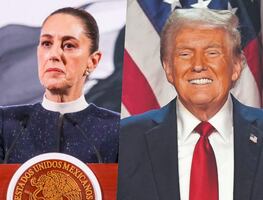Más Información

Sheinbaum responde a Trump sobre declarar a cárteles como organizaciones terroristas; rechaza injerencia extranjera

PAN exige renuncia de Rubén Rocha Moya; Claudia Sheinbaum sigue protegiéndolo en “complicidad vergonzante”

No cesaremos ni nos rendiremos en nuestro llamado a la paz y justicia: Iglesia; pide ser persistentes en exigencia

Con reformas laborales, expertos ven estrategia de Morena; van a fortalecer su número de simpatizantes
When Ricardo Anaya , national leader of the National Action Party (PAN) claimed before a judge that, allegedly, EL UNIVERSAL didn't grant him the right of rebuttal, he turned a journalistic affair into a legal fight. He has the right to do so. What he doesn't have the right to do is use the broadcast time the State grants to political parties to defend himself.
In the latest electoral spot of the PAN, broadcasted during official radio and television times allotted to the State, he used the image of journalists Denise Maerker and Ciro Gómez Leyva, as well as the logo of EL UNIVERSAL to say that a right of rebuttal trial found the articles published by this newspaper regarding his estate “weren't true.” However, the judge's findings weren't about the veracity of the information.
Beyond the lies, what is the main cause of concern about this advertising spot is that it opens the door to privatizing a public resource, as are the official broadcast times in radio and television. Ricardo Anaya is using this public resource – granted to a political party, not him – to try and convince the Mexican citizens he didn't amass a wealth through his political career. Despite this blatant private usage, the National Electoral Institute (INE) decided to ignore the request to stop broadcasting the spot or to offer EL UNIVERSAL the possibility of replying to Anaya within the same space he is using.
It seems the INE is incapable of defending the public resources it manages. Perhaps it's because councilor appointments – and dismissal – depend on the political parties the institute is supposed to regulate. With such a weak authority, we have certitude to worry about during the upcoming electoral contest.
Another element which is troublesome about the spot is that it's equating an “attack” to a criticism. Is it an “attack,” like the message says, to write an article on the properties and estate of a political leader? Does it mean that, in the future, if the media expose the wealth of a politician this fact has to be considered an aggression? The INE is endorsing an attack on freedom of speech .
Like the former magistrate Salvador Nava said in an article published yesterday in El Financiero: “We would have to define whether an article can be considered an attack and whether exercising the right of freedom of speech is an attack against a political party and its national leader over an issue (illicit enrichment) which is of public interest.”
With this action, Anaya is using his party, and taxpayers, for his personal benefit but what is worse is that he does so with the support of the INE councilors.
am






